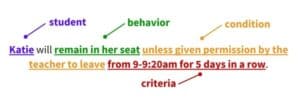(Listen to this content instead on our podcast)
One question we hear often from parents getting ready for their child’s IEP meeting is “what should the IEP say?” (IEP is an Individualized Education Program ) You want advice on what exactly to write for each IEP goal, what goals to include, and examples of what other parents have written in theirs. It’s a hard question to answer quickly, because there really isn’t a one-size-fits-all answer. Each IEP will look different from one child to the next.
That said, there is good advice out there on what parents should think about when getting ready to review their child’s IEP. Dr. Anne M. Howard, professor at Fitchburg State University and board member for the Federation of Children with Special Needs, has created a tip sheet for parents called: “Writing Measurable Goals and Objectives”. Dr. Howard’s tips help parents answer questions like:
-
Does this IEP goal make sense?
-
Is it meaningful?
-
How will I know when my child has met this goal?
-
What info do I need in order to support this goal?
An effective and measurable IEP goal should include these four pieces:
The goal will mention the student. This is important because it can help keep everyone on the IEP team focused on your child, and it will also help the teacher remember which goals your child is trying to work towards in comparison with the rest of their class.
-
The goal will describe a condition. By describing a certain condition or scenario in a goal, you and the IEP team can stick to the plan and know when the student is expected to show their skill or behavior. Think about the different kinds of situations your child may find themselves in during the school day – they may ask questions to their teacher, complete their schoolwork, or ride the bus. If your child has trouble in one of these examples, put that condition in the IEP.
“When asked to complete a task…”
“When eating lunch in the cafeteria…” -
The goal will name a skill or behavior that your child should be working on. This is where it is helpful to think about actionable goals, or goals that you can see, hear, or measure. Try to focus on what you want your child to be able to do, and what that looks like.
“…answer five questions in a row on a worksheet before…”
“…copy each word in cursive handwriting” -
The goal will explain the criteria for performance. This part describes what will prove that your child has met the goal. It will include time (minutes, hours) and something measurable, like a test score.
“…within one minute after bell rings…”
“…with a score of 35/40 on the test…”
What does that look like when you’re putting all four of these pieces together? [h2]
Here is an example of an academic IEP goal:
Here is an example of an behavior-related IEP goal:
As you are reviewing your child’s IEP, make sure that each goal includes each of these pieces: the student, the condition, the skill or behavior, and the criteria. Understood.org can also offer some help in figuring out how to tell if your child’s IEP goals are SMART.
Ready for more? Check out our website for more information on how to create an effective IEP and prepare for your next IEP meeting.
These guides were written for the 2 states, but most of the information is the same for anyone:
Special Education Guide, Louisiana
Special Education Guide, Massachusetts
The Exceptional Lives team is available to answer any questions you may have along the way. Give us a call at 1-844-628-4866 or send us an email at info@exceptionallives.org.




